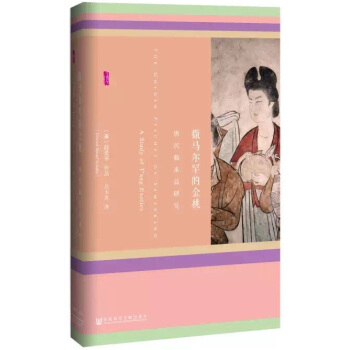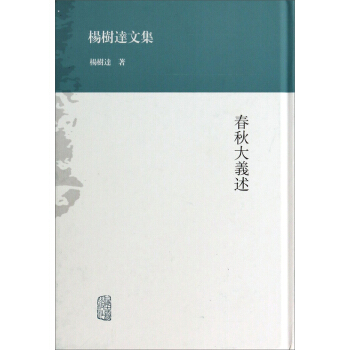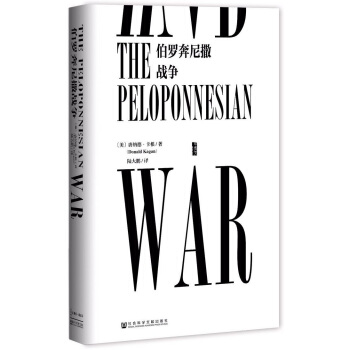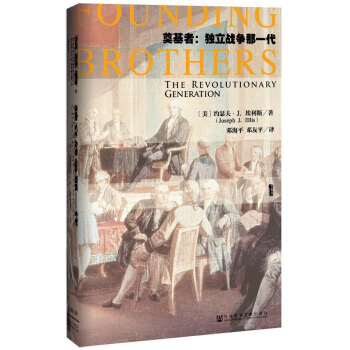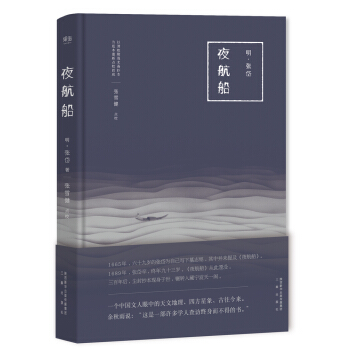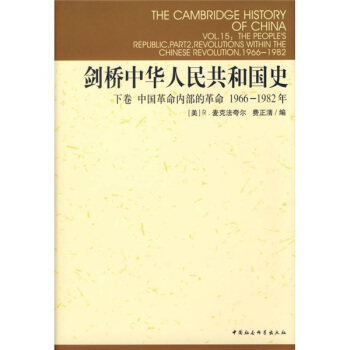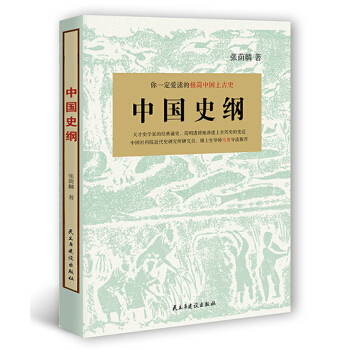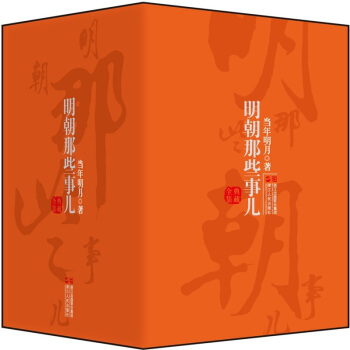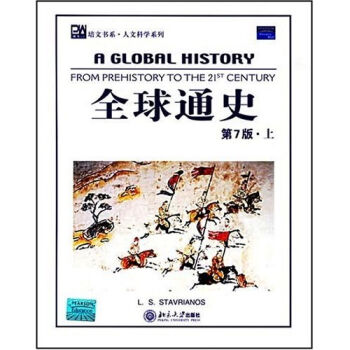

具体描述
编辑推荐
近年来,在用全球观点或包含全球内容重新进行世界史写作的尝试中,最具有推动作用的那些著作恰恰是由历史学家个人独立完成的,其中以斯塔夫里阿诺斯的《全球通史》最为著名。――杰弗里?巴勒克拉夫
《全球通史》给了我强烈的真实感:它是一种思想武器,可以用来救治我们现在所面临的由于陶醉于技术进步而产生的深重的精神危机;它有助于人们理解未来,包含各种可能性和选择的未来。
――阿诺德?汤因比
内容简介
《全球通史(上下)》本书初版问世以来,赞誉如潮,被译成多种语言流传于世,可谓经典之中的经典。后经作者多次修订增补,现已更新至第7版,在保留原文精华的基础上,又融入了时新的研究成果,使这部名著在内容和体系上更加完善。 尤其值得一提的是,作者文笔隽永、笔力深厚、才思横溢,整部著作前后一贯。 这里呈现原汁原味的英文版以飨广大读者,让您在颇具历史韵律的行文中思接千载,视通万里。 近年来,在作全球观点或包含全于内容重新进行世界史写的尝试中,最具有推动作用的那些著作恰恰是由历史学家个人独立完成的,其中以斯塔夫里阿诺斯的《全球通史》最为著名。作者简介
斯塔夫里阿诺斯,是美国加州大学的历史学教授,享誉世界的历史学家,曾获得过古根海姆奖、福特杰出教师奖秒各克菲勒基金奖等一系列学术荣誉。虽然他以《全球通史》享誉世界,但实际上他著述颇丰,还有大量其他伤口为学术界称道。除《全球通史》外,斯塔夫里阿诺斯的作品还包括《1453年以来的巴尔干各国》、《奥斯曼帝国:它是欧洲的病人吗?》、《全球分裂:第三世界的历史进程》和《源自我们过去的生命线:新世界史》等。 斯塔夫里阿诺斯教授已于2004年3月23日在美国加州荷亚去世,本书不但是斯氏《全球通史》的最新版本,也成了其最后版本。目录
英文目录地图索引
致读者
致谢
图片来源
第一编 史前人类
第1章 引言:世界史的性质
第2章 人类——食物采集者
第二编 欧亚大陆的古典文明(公元500年之前)
第3章 最初的欧亚大陆文明
第4章 古典文明开启欧亚大陆一致性
第5章 希腊——罗马文明
第6章 印度文明
第7章 中国文明
第8章 古典文明的终结
历史对今天的启示 文明:是祸还是福?
第三编 欧亚大陆中世纪的文明
第9章 中世纪文明形成欧亚大陆一致性
第10章 伊斯兰教的兴起
第11章 突厥人的蒙古人的入侵
第12章 传统的拜占廷文明
第13章 传统的儒家文明
第14章 革命的西方文明
历史对今天的启示 发达社会与“遏制领先”
第四编 公元1500年以前的非欧亚大陆世界
第15章 非洲
第16章 美洲和澳大利亚
第17章 欧洲扩前夕的世界
历史对今天的启示 历史中的民族
第五编 1500年以前诸孤立地区的世界
第18章 西方扩张时的穆斯林世界
第19章 西方扩张的儒家世界
第20章 扩张中的西方文化:文艺复兴和宗教改革
第21章 西方文明的扩张:经济扩张和国家建设
历史对今天的启示 历史与关于历史的流行理论
第六编 西方崛起的世界
第22章 西欧的扩张:伊比利息亚阶段
第23章 西欧的扩张:荷兰、法国、英国阶段
第24章 俄国在亚洲的扩张
第25章 全球统一性的开始
历史对今天的启示 从世界历史看地区自治与全球统一
第七编 西方据优势地位时的世界
……
第八编 1914年以来西方衰落与成功的世界
术语表
索引
精彩书摘
Ⅳ.MONGOL DECLINEThe basic reason for the decline of the Mongols was that they were too few in number and too primitive in relation to their subject peoples.The Mongols, as Pushkin put it, were "Arabs without Aristotle and algebra." This left them wlnerable to assimilation as soon as they dis-mounted from their horses and settled down to enjoy their conquests. In this respect they dif-fered fundamentally from the Arabs, who had both a language and a religion that their sub-jects were willing to adopt and which served as strong bonds for imperial unity. The Mongols,being less advanced than the Arabs, enjoyed no such advantage. Rather, the opposite was the case with them, for they adopted the languages,religions, and cultures of their more-advanced subjects and thereby lost their identity. This was the root reason why their empire dissolved so soon after its creation.
Indicative of the assimilation process was Kublai Khan's decision to move the Mongol cap-ital from Karakorum to Peking. Inevitably he became a Chinese-style emperor, ruling from a palace of Chinese design, conducting elaborate Confucian ceremonies, and building new Con-fucian temples. As the Grand Khan, he was nominally the suzerain of all the Mongol khanates. Actually his authority did not extend beyond China. His brother Arikboga had con- tested his election as Grand Khan. Kublai Khan had prevailed only after a four-year struggle.Then he was challenged by his cousin, Kaidu,who controlled Turkestan, and the ensuing forty-year civil war ended in stalemate. Thus the Mongol Empire was shattered by internal dynas-tic rivalries as well as by cultural assimilation.
While Kublai Khan was becoming a Chi-nese emperor, Hulagu was becoming a Persian ruler. With Tabriz as his capital he established the so-called Ilkhanate. (The term Ilkhan means "subject Khan" and was applied to the Mongol rulers of Persia as subordinates to the Grand Khan.) His successor's adoption of Islam in 1295 as the offiaal religion both reflected and acceler-ated the Mongols' assimilation into their Iran-ian-lslamic milieu. Likewise the Golden Horde across the Caucasus went its own way, influ-enced by the native Christian Orthodox culture and by the official Islamic creed. Before long the only remaining pure Mongols were those in ancestral Mongolia, where they came under the influence of Buddhism and sank into impotent obscurity.
It is a tribute to Marco Polo's keen insight that he foresaw Mongol decline even when he was serving under the great Kublai Khan. In his account of his travels, Marco Polo made the fol-lowing significant analysis of the assimilation of the Mongols by the people they conquered.
All this that I have been telling you is true of the manners and customs of the genuine Tatars [Mon-gols]. But I must add also that in these days they are greatly degenerated; for those who are settled in Cathay have taken up the practices of the Idolaters of the country, and have abandoned their own institu-tions; whilst those who have settled in the Levant have adopted the customs of the Saracens.
Ⅴ.TURKISH REVIVAL
Since the Mongols were so few in number, they had taken an ever-increasing proportion of Turks into their armies. Then with the breakup of the empire these Moslem Turks quickly came to the fore, as they had earlier in the caliphate before the Mongol onslaught. A succession of military adventurers now rose and fell in the struggle for control of the central Eurasian steppes. The most remarkable of these was Timur, known to Europe as Tamerlane. He seized Samarkand in 1369, and from there he struck out in all direc-tions. First he destroyed the Ilkhanate in Persia and Mesopotamia, then defeated the Golden Horde in Russia and the Ottoman Turks in Asia Minor, and he even invaded India and sacked Delhi. He was determined to make his capital,Samarkand, the finest city in the world, and after each campaign he sent back caravans loaded with booty, together with craftmakers,artists, astrologers, and scholars. At its height,his empire extended from the Mediterranean to China, and Timur was preparing to invade the latter country when he died in 1405. His empire then disintegrated even more rapidly than that of the Mongols.
……
前言/序言
用户评价
这本大部头简直是历史爱好者的福音,一口气读完,感觉就像是跟着一位博学的向导,穿越了人类文明的漫漫长河。作者的叙事功力实在了得,他没有将历史简单地堆砌成枯燥的年代和事件罗列,而是巧妙地将不同地域、不同文明的发展脉络编织在一起,让人能清晰地看到全球互动是如何塑造我们今天的世界的。尤其欣赏的是它对“非西方”视角的平衡处理,不再是那种以欧洲为中心的单一叙事模式,而是真正展现了多元文明的碰撞与融合,那种对古代中原王朝与同时期美洲文明之间交流(或缺乏交流)的对比分析,深邃而发人深省。翻阅的每一页,都能感受到那种宏大叙事的磅礴气势,同时又不失对细节的精准把控,比如对某个关键技术革新在不同文化圈传播速度差异的探讨,细致到让人拍案叫绝。装帧和纸张的手感也相当不错,作为一本影印版,印刷质量保持了应有的水准,长时间阅读下来,眼睛也不会感到过于疲劳,这对于这种动辄需要数周才能啃完的巨著来说,简直是加分项。
评分这套书的篇幅和深度,要求读者投入相当的时间和精力,但回报是极其丰厚的。它最吸引我的地方,在于它构建了一个极具说服力的“整体性”历史观。我们常说的历史是“进步”的,但这本书通过对比不同文明在特定时期的发展曲线,会让你对“进步”这个词产生更审慎的理解。它清晰地展示了,在某个技术领域领先的文明,可能在社会组织或哲学思想上处于相对滞后的状态,这种多维度的衡量标准,极大地拓宽了我的历史视野。购买这本书,更像是一种对知识体系的系统性投资,它提供的知识框架足以支撑你在未来阅读任何关于特定国家或时期的深度研究时,都能迅速建立起宏观背景。对于想要从根本上理解人类社会如何在地球这个有限的舞台上,通过不断试错和适应,一步步走到今天的读者而言,它绝对是案头必备的“镇山之宝”。
评分我得说,这本“通史”的结构安排真是匠心独运,它成功地将“通”与“深”这两件看似矛盾的事情完美地统一了起来。刚开始我还有些担心,这种横跨数万年、涉及全球的史诗级作品,会不会读起来像是在走马观花,每个文明都蜻蜓点水。然而,作者的章节划分逻辑非常清晰,他总能在关键的历史转折点——比如农业革命的扩散、主要宗教的兴起、全球贸易网络的初步形成——进行深入的专题剖析。这种深挖并不影响整体的流畅性,反而是为后续更宏大的叙事打下了坚实的基础。我尤其喜欢它处理“全球化”概念的方式,它并非生硬地套用现代术语,而是追溯了这种互联互通的起源和早期形态,能让人理解到人类社会从分散走向整合的内在驱动力究竟是什么。对于那些已经读过一些局部断代史的朋友来说,这本书提供了一个绝佳的“鸟瞰图”,让你能把碎片化的知识点重新安放到一个更合理的历史坐标系中去理解。
评分这本书的强大之处,在于它不仅仅是记录“发生了什么”,更在于它不断追问“为什么会这样发生”以及“这对其他地方产生了什么影响”。它对地理环境、气候变化,乃至瘟疫传播对人类社会结构带来的冲击有着极其细致的描绘。我记得有一章专门对比了不同地区在应对气候波动时的社会韧性,那段内容给我触动很大,它揭示了文明的兴衰并非总是由内生的政治腐败决定,外部的自然压力也是一个常被低估的关键变量。而且,本书在处理文化交流时,也很有现代史学的眼光,不再是单纯的“谁影响了谁”,而是强调了“文化借用”和“在地化改造”的复杂过程。比如,某个技术或思想概念在传入新地域后,是如何被当地的社会结构和信仰体系重新塑造成一种全新的形态的,这种动态的视角,使得整个历史进程显得鲜活而非僵死。读完后,你会发现,历史上的许多“孤立事件”其实都暗含着跨区域的互动网络。
评分说实话,作为一名历史爱好者,阅读体验有时候取决于翻译的质量,而这本英文影印版恰好规避了翻译带来的信息损耗问题。原汁原味的英文行文,那种严谨的学术腔调和精准的词汇运用,本身就是一种享受。作者的文笔谈不上多么华丽的文学色彩,但其论证的逻辑性和观点的穿透力,绝对是顶级的。尤其是在讨论中古晚期到近代的权力结构演变时,那种对国家机器形成、官僚体系专业化的冷静分析,让人感觉作者本人就像一个高悬于历史之上的观察者,不带太多个人情感色彩地描述着人类社会是如何一步步构建起复杂的治理模式的。对于需要用英文原版进行学术参考的读者来说,这套书的价值几乎是不可替代的。唯一的“小瑕疵”可能就是对于非英语母语的读者来说,某些复杂的长难句需要多读几遍才能完全消化其含义,但这恰恰也反映了原著的学术深度。
评分很好!
评分我们销售的空调匹配内都是享受免费安装调试的哦,安装包连接管(挂机3米,柜机4米,2匹或2匹以上不含插头),涉及到支架、高空作业费、水钻打孔等额外材料是要另外收费的哦。
评分还不错 正版
评分非常好,慢慢看
评分书挺不错的,纸质也还可以。
评分非常不错哦!值得购买。
评分学英语的好帮手,培养兴趣
评分好非常好非常好非常好非常好非常好非常好非常好非常好非常好非常好非常好非常好非常好非常好非常好非常好非常好非常好
评分《全球通史(上下)》本书初版问世以来,赞誉如潮,被译成多种语言流传于世,可谓经典之中的经典。后经作者多次修订增补,现已更新至第7版,在保留原文精华的基础上,又融入了时新的研究成果,使这部名著在内容和体系上更加完善。 尤其值得一提的是,作者文笔隽永、笔力深厚、才思横溢,整部著作前后一贯。 这里呈现原汁原味的英文版以飨广大读者,让您在颇具历史韵律的行文中思接千载,视通万里。 近年来,在作全球观点或包含全于内容重新进行世界史写的尝试中,最具有推动作用的那些著作恰恰是由历史学家个人独立完成的,其中以斯塔夫里阿诺斯的《全球通史》最为著名
相关图书
本站所有内容均为互联网搜索引擎提供的公开搜索信息,本站不存储任何数据与内容,任何内容与数据均与本站无关,如有需要请联系相关搜索引擎包括但不限于百度,google,bing,sogou 等,本站所有链接都为正版商品购买链接。
© 2026 windowsfront.com All Rights Reserved. 静流书站 版权所有




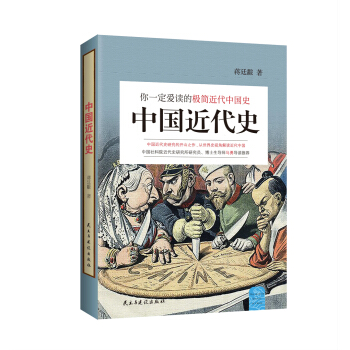
![人性中的善良天使:暴力为什么会减少(套装上下册) 【荐书联盟推荐】 [The Better Angels of Our Nature] pdf epub mobi 电子书 下载](https://pic.windowsfront.com/11577785/55ac94d9Na711fd99.jpg)
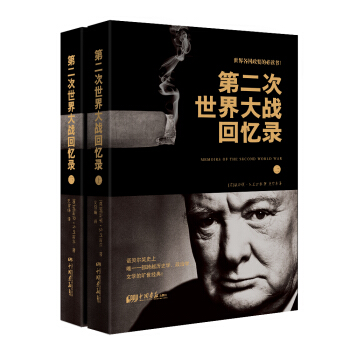

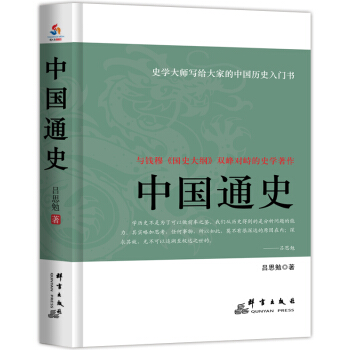

![历史深处的忧虑 [近距离看美国之一] pdf epub mobi 电子书 下载](https://pic.windowsfront.com/11308004/56025c82Nc28064a2.jpg)
